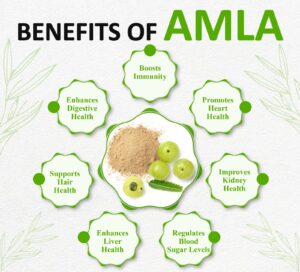Amla, scientifically known as Emblica officinalis, is a small, green fruit renowned for its potent health benefits and has been a cornerstone of Ayurvedic medicine for centuries. This nutrient-dense superfruit is exceptionally rich in vitamin C, boasting more than 20 times the amount found in oranges, alongside essential vitamins, minerals, and antioxidants.
Recent scientific studies have validated many of the traditional claims, highlighting amla’s efficacy in enhancing immunity, supporting digestive health, promoting cardiovascular wellness, and much more. At NaturMed Scientific, we are committed to harnessing these benefits through our high-quality “Amla Extract containing Tannins and Vitamin C,” making it easier for you to integrate this powerful fruit into your daily health regimen.
Also Read: Standardized Botanical Extracts
Nutritional Profile of Amla
Amla is a powerhouse of nutrients. It is rich in vitamin C, containing more than 20 times the amount found in oranges. Additionally, it provides essential nutrients such as:
- Vitamin A: Supports eye health.
- Vitamin E: Acts as an antioxidant.
- Iron: Crucial for blood production.
- Calcium: Important for bone health.
- Fiber: Aids digestion.
These nutrients make amla a potent fruit with multifaceted health benefits.

1. Boosts Immunity
One of the most celebrated benefits of amla is its ability to boost the immune system. The high concentration of vitamin C enhances the body’s defense mechanisms by promoting the production of white blood cells, which are essential for fighting infections.
2. Enhances Digestive Health
Amla is known for its positive effects on the digestive system. The fiber content in amla aids in regulating bowel movements, preventing constipation, and promoting the growth of healthy gut bacteria.
A double-blind, placebo-controlled clinical trial tested Amla tablets for non-erosive reflux disease (NERD). Sixty-eight patients received either Amla or placebo for four weeks. The Amla group saw significant reductions in heartburn and regurgitation frequency and severity, proving Amla’s efficacy and safety in alleviating NERD symptoms.
Another study on Amla found it has antidiarrheal and antispasmodic effects by blocking muscarinic receptors and calcium channels. Tests on mice and isolated tissues showed that Amla extract effectively inhibited diarrhea and relaxed intestinal contractions. These results support its traditional use in treating diarrhea.
3. Promotes Heart Health
Cardiovascular health can significantly benefit from regular consumption of amla. It helps in reducing bad cholesterol (LDL) levels and increasing good cholesterol (HDL) levels. Amla’s antioxidants prevent the oxidation of LDL cholesterol, which is a primary cause of atherosclerosis.
A study published in the Indian Journal of Pharmacology compared the hypolipidemic efficacy of Amla (Emblica officinalis) with simvastatin in patients with type II hyperlipidemia. Sixty patients were treated with either Amla capsules (500 mg daily) or simvastatin (20 mg daily) for 42 days. Both treatments significantly reduced total cholesterol, LDL, triglycerides, and VLDL levels while increasing HDL levels.
Additionally, Amla showed a more notable reduction in blood pressure among hypertensive patients compared to simvastatin. The study suggests that Amla could be a beneficial addition to existing hypolipidemic therapies, offering significant protection against atherosclerosis and coronary artery disease.
4. Regulates Blood Sugar Levels
For individuals with diabetes, amla can be particularly beneficial. The fruit’s polyphenol content has properties that protect against oxidative stress, which can lead to complications in diabetes. Amla helps in regulating blood sugar levels by stimulating insulin secretion and improving glucose uptake by cells.
A study in the International Journal of Food Sciences and Nutrition evaluated the effects of Amla (Emblica officinalis) on blood glucose and lipid profiles in normal and type 2 diabetic patients. Both groups experienced significant reductions in fasting and post-prandial blood glucose levels and improvements in lipid profiles after 21 days of taking 1-3 grams of Amla powder daily.
The study concluded that Amla has significant anti-hyperglycemic and lipid-lowering properties, beneficial for managing blood glucose and cholesterol levels in both normal and diabetic individuals.
Also Read: Food’s Role as an Immunomodulator
5. Supports Hair Health
Amla is commonly used to promote hair growth and prevent hair loss.
In a study involving 42 people with hair loss, participants applied a serum containing amla, coconut water, and selenium daily for 90 days. This treatment resulted in significant improvements in hair growth and density, demonstrating the potential benefits of topical application of amla-based products.
Another study highlighted amla’s ability to inhibit a specific enzyme associated with hair loss. This finding suggests that amla may play a role in preventing hair loss by targeting underlying biological mechanisms.
Furthermore, a test-tube study indicated that amla extract might stimulate hair growth by promoting the proliferation of specific cells in hair follicles. This suggests that amla has the potential to enhance hair regeneration at the cellular level.
While these studies focus on the topical application of amla, it is unclear whether drinking amla juice has the same effect on hair growth. Amla juice contains several beneficial nutrients, including antioxidants and vitamin C, which are known to support overall hair health. However, more research is needed to fully understand how consuming amla juice impacts hair health.
6. Enhances Liver Health
Although human research is limited, animal studies show promising results regarding amla juice’s potential to improve liver function.
One study found that feeding amla to rats on a high fructose diet increased levels of key proteins involved in metabolism, potentially preventing fructose-induced fatty liver disease.
Another study observed that amla extract reduced body weight and belly fat while improving fatty liver disease in rats on a high-fat diet.
Additionally, amla juice is rich in antioxidants and has powerful anti-inflammatory properties, both of which are beneficial for liver health.
7. Improves Kidney Health
Amla juice, rich in antioxidants, has been shown to support kidney health in various studies.
For example, one animal study demonstrated that administering amla extract to rats helped protect against kidney damage and preserve kidney function. This suggests that the antioxidant properties of amla may play a crucial role in safeguarding the kidneys from harm.
Another older animal study found that amla extract could prevent age-related kidney dysfunction by reducing oxidative stress. This indicates that amla’s antioxidant effects may help maintain kidney health as animals age.
Additionally, a separate animal study showed that amla extract helped normalize kidney function and increase antioxidant status in rats treated with a medication that induces kidney toxicity. This further supports the potential of amla to counteract kidney damage caused by harmful substances.
While these findings are promising, additional studies are necessary to determine how drinking amla juice in typical food amounts might affect human kidney function. More research is needed to establish the effectiveness and safety of amla juice for kidney health in humans.
Safety Profile of Amla
A randomized, double-blind, crossover placebo-controlled clinical trial evaluated the health benefits and safety of Emblica Officinalis (Amla) in healthy human subjects. The study involved 15 participants given 500 mg of amla or a placebo daily for 18 weeks. The study measured vascular function, blood parameters, oxidative and inflammatory biomarkers, glucose and lipid profiles, urinalysis, and liver function.
Key Findings:
Vascular Health: Amla significantly improved blood fluidity and endothelial function. It reduced oxidative stress markers, such as von Willebrand factor (vWF), 8-hydroxy-2′-deoxyguanosine (8-OHdG), and thrombin (TM).
Lipid Profile: Amla intake increased HDL-cholesterol and lowered LDL-cholesterol levels, contributing to better cardiovascular health.
Oxidative Stress: Amla demonstrated strong antioxidant properties, reducing markers of oxidative stress and DNA damage.
Safety: No adverse effects were observed. Liver function, urinalysis, and blood hematology remained normal, indicating the safety and tolerability of amla supplementation.
The study confirms that amla supplementation is safe and offers significant health benefits, particularly in improving vascular function and reducing oxidative stress without affecting liver or kidney function.
Amla, the Indian Gooseberry, is truly a wonder fruit with extensive health benefits. From boosting immunity and enhancing digestive health to promoting heart health and regulating blood sugar levels, amla proves to be an indispensable part of a healthy lifestyle. At NaturMed Scientific, we provide the finest botanical extracts, including our “Amla Extract containing Tannins and Vitamin C“. Incorporating this potent extract into your daily routine can help you reap the numerous benefits of amla in a convenient and effective manner.
Harness the power of nature with NaturMed Scientific and make amla a part of your journey to better health.
References:
- https://pubmed.ncbi.nlm.nih.gov/21093572/
- https://pubmed.ncbi.nlm.nih.gov/29526236/
- https://www.healthline.com/nutrition/amla-juice
- https://www.ncbi.nlm.nih.gov/pmc/articles/PMC3326920/
- https://www.ncbi.nlm.nih.gov/pmc/articles/PMC7522433/
- https://pubmed.ncbi.nlm.nih.gov/22178180/
- https://shorturl.at/tkiia
- https://www.ncbi.nlm.nih.gov/pmc/articles/PMC4045981/
- https://pubmed.ncbi.nlm.nih.gov/17715896/
- https://www.ncbi.nlm.nih.gov/pmc/articles/PMC5045924/
- https://pubmed.ncbi.nlm.nih.gov/23978895/
- https://pubmed.ncbi.nlm.nih.gov/24940994/
- https://pubmed.ncbi.nlm.nih.gov/24940994/
- https://pubmed.ncbi.nlm.nih.gov/28128372/
- https://pubmed.ncbi.nlm.nih.gov/21761987/
- https://www.webmd.com/diet/health-benefits-amla
Disclaimer: The Statement has not been evaluated by the EFSA, KFDA or FDA. This product is not intended to diagnose, treat, cure, or prevent any disease. While the information provided is based on credible references, we do not make any specific claims or guarantees. It is important to consult with your healthcare advisor for personalized advice and guidance related to your health.





